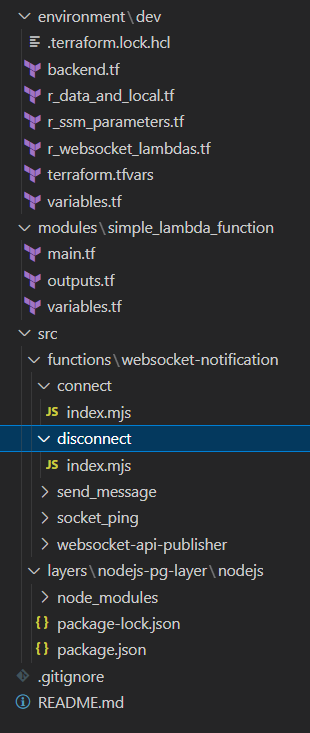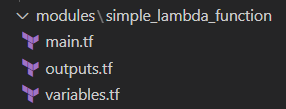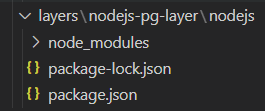Why?
For sure it is very handy to define lambda functions, and then test it and deploy it in console directly. But problem occurs when:
- You have plenty of them,
- with each being granted appropriate policy for differnet AWS resources, or even internal VPC resources.
- You need to define the common connection-endpoint/credential (like database host, service API-key, etc) which are shared by many lambda functions
- You need to replicate all of the above in
DEV,UATandPRODenvironment.
Without a terraform project to manage all of them, you are bound to run into chaos in very early stage.
Separation of Concerns (Namespaces)
-
This project only focues on versioning the lambda functions (as well as the layers they use) sporatically defined in AWS console. The creation of polices and the attachments are not governed here.
-
That being said, our current project is created in a separated namespace (in terms of terraform cloud).
-
Policies like RDS-Proxy Access, S3 Access, DynamoDB Access, Apigateway Websocket API Access, etc, should all be managed in the root terraform module in which you define your core infrastructure.
Project Structure

Module Creating Function and Layer
Let's focus on this part:

main.tf
We will apply offical modules to create our own custom module.
Define a Function
1# main.tf 2 3module "lambda_function" { 4 source = "terraform-aws-modules/lambda/aws" 5 function_name = var.function_name 6 description = var.description 7 handler = "index.handler" 8 runtime = "nodejs22.x" 9 publish = true 10 11 source_path = var.nodejs_function_source_path 12 13 store_on_s3 = false 14 15 layers = module.lambda_layer_nodejs_pgs[*].lambda_layer_arn 16 17 environment_variables = var.env_variable 18 19 tags = { 20 Module = "lambda-with-layer" 21 } 22}
Note that the highlighted is an import of the layer defined in the module right below:
Define a Layer
# main.tf module "lambda_layer_nodejs_pgs" { count = length(var.nodejs_layer_source_path) > 0 ? 1 : 0 source = "terraform-aws-modules/lambda/aws" create_layer = true layer_name = "terraform-pg-layer" description = "Layer to enable import pg from 'pg'" compatible_runtimes = ["nodejs22.x", "nodejs18.x", "nodejs20.x"] source_path = var.nodejs_layer_source_path store_on_s3 = false }
outputs.tf
output "function_name" { value = var.function_name } output "invoke_arn" { value = module.lambda_function.lambda_function_invoke_arn }
The invoke_arn is used in defining the websocket-api of apigateway through terraform. This will not be used in this article.
variables.tf
variable "env" { type = string } variable "description" { type = string } variable "nodejs_layer_source_path" { type = string } variable "nodejs_function_source_path" { type = string default = "" } variable "function_name" { type = string } variable "env_variable" {}
Lambda Function File Structure and Lambda Layer Structure
Function
NPM Package Layer
Deploy a set of Lambda Functions with shared Configuration and Credentials
Each function must be named index.js or index.mjs, with a folder containing it:

Import configs from AWS Parameter Store (SSM) and Existing AWS Resources
- Each nodejs layer must be of the form
<layer-name>/nodejs/ - of which you need to define
package.jsonand - you need an
node_modulesby runningyarnornpm install.

Direct import of resources
# r_data_and_local.tf data "aws_db_proxy" "billie_rds_proxy" { name = var.rds_proxy_identifier }
Handle json string from SSM
# r_data_and_local.tf data "aws_ssm_parameter" "rds_proxy_parameter" { name = var.rds_proxy_parameter_name } locals { rds_proxy_config = jsondecode(data.aws_ssm_parameter.rds_proxy_parameter.value) }
We access the attribute in the json string by local.rds_proxy_config.db.username
Deploy Functions and Create Layers with Configs in Environment Variables
# r_websocket_lambdas.tf locals { websocket_lambdas = { connect = { function_name = "notification-socket-connect-${var.env}" function_source = "../../src/functions/websocket-notification/connect" layer_source = "../../src/layers/nodejs-pg-layer" description = "api gateway websocket in ${var.env} on socket connection" } disconnect = { function_name = "notification-socket-disconnect-${var.env}" function_source = "../../src/functions/websocket-notification/disconnect" layer_source = "../../src/layers/nodejs-pg-layer" description = "api gateway websocketin ${var.env} on socket disconnection" } api-publisher = { function_name = "notification-api-publisher-${var.env}" function_source = "../../src/functions/websocket-notification/websocket-api-publisher" layer_source = "" description = "Used to publish messages to connectionId" } } } module "wbsocket_lambda" { for_each = local.websocket_lambdas function_name = each.value.function_name source = "../../modules/simple_lambda_function" nodejs_function_source_path = each.value.function_source nodejs_layer_source_path = each.value.layer_source description = each.value.description env = var.env env_variable = { db_user = local.rds_proxy_config.db.username db_password = local.rds_proxy_config.db.password db_host = local.rds_proxy_config.db.host db_name = local.rds_proxy_config.db.dbname } }
Now all of our lambda functions can access process.env.db_password!
Store results as a json string into SSM
Sometimes we wish to store the specific data of lambda resources back to AWS (most of the time the function_name itself is enough)
# r_ssm_parameters.tf resource "aws_ssm_parameter" "billie_notificatoin_socket" { name = "/billie/${var.env}/notification/web/lambdas" type = "String" value = jsonencode({ connect = { function_name = module.wbsocket_lambda["connect"].function_name invoke_arn = module.wbsocket_lambda["connect"].invoke_arn } disconnect = { function_name = module.wbsocket_lambda["disconnect"].function_name invoke_arn = module.wbsocket_lambda["disconnect"].invoke_arn } api_publisher = { function_name = module.wbsocket_lambda["api-publisher"].function_name invoke_arn = module.wbsocket_lambda["api-publisher"].invoke_arn } }) }
Prototype of Project Configuration in DEV: variables.tf
This file serves as a strong typing of terraform.tfvars:
# variables.tf variable "aws_region" { type = string } # overridable by github action variable "env" { type = string } # overridable by github action variable "rds_proxy_identifier" { type = string } variable "rds_proxy_parameter_name" { type = string }